#political allegory
Text

The Attack by Edvard Isto, 1899.
Context: allegory for the russification of Finland.
#classic art#painting#edvard isto#finnish artist#19th century#realism#allegorical art#political allegory#woman#white dress#birds#eagles#books#sea
109 notes
·
View notes
Text
One of the worst sci-fi tropes ever is when aliens contact humans they judge us, except their judgements don't feel alien in nature. Instead their judgements are usually the exact same things that real-life center left human political pundits say. Like the aliens dock and they'll say something whack like "Hm, such a primitive species, they pollute their environment and go to war with each other for oil". Oh wow, this definitely isn't the author projecting their rote standard political views onto this advanced super wise super intelligent space alien. It's so boring and hamfisted.
They are ALIENS. They should not give a FUCK about whatever you think is important as a human. Get WEIRD with it. If I'm going to be judged by an alien, I want them to judge us for some weird ass alien Sci-Fi reasons. I want them to feel alien, I want to see a creatively written perspective and not a carbon fucking copy of completely standard points of view that already exist on planet earth in huge numbers.
I'm all for using Sci-Fi to make allegorical points too, political or otherwise. But when the ultra-intelligent interstellar space alien is repeating human points verbatim, except more smugly and more judgemental I roll my eyes so hard. Like how is this species from another galaxy exactly ideologically alligned with the average George Bush-era American democrat. It's so weird.
27 notes
·
View notes
Text
On April 9, 1956, Invasion of the Body Snatchers debuted in Canada.

#invasion of the body snatchers#invasion of the body snatchers 1956#don siegel#dana wynter#science fiction#sci fi horror#horror art#horror film#satire#political allegory#1950s#movies#film#sticker art#art#movie art#drawing#movie history
2 notes
·
View notes
Text

#JakeReviewsItch
Alt-Frequencies
by Plug In Digital, Accidental Queens
Price (US): $4.99
Included In: Bundle for Ukraine
Genre: Interactive Fiction, Puzzle
Pitch: Pitch.
My expectations: From the developers of A Normal Lost Phone? You have my attention.
Review:
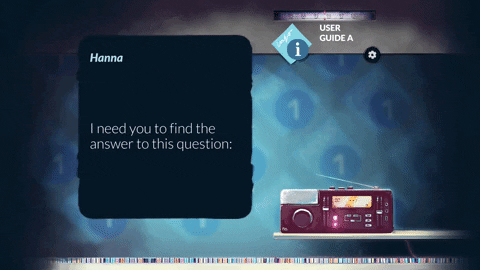
The first plot point you’re likely to encounter in Alt-Frequencies is that the nation will vote on the time loop at the end of the week.
The second comes in the form of a blinding light and a radio repeating itself.
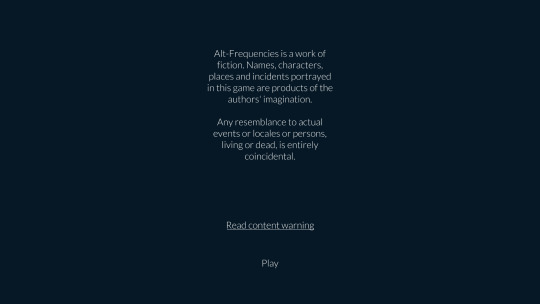
My big complaint about A Normal Lost Phone was that displaying a content warning on the first screen of the game, while necessary, spoiled everything for those without content sensitivities. Alt-Frequency also has a content warning on its first screen, which it hides by default. Small change; huge improvement.
I’ll not say another word about the narrative, except that they’ve nailed it. Alt-Frequencies is worth playing for the story alone.
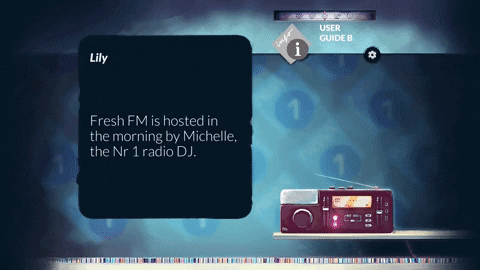
Yet it’s the game part that appeals to me most: Record a snippet from the radio (that is, a single text box) and call in to another station to play the recording. Finding the needle in the red-herring stack can be a challenge, but once you get it, you’ll wonder how you ever missed it.
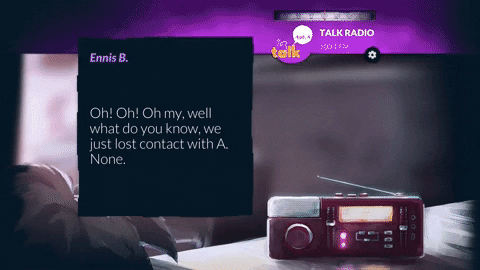
Each radio loop is just a few minutes long, with the option to skip forward one text box, so listening to / reading the full broadcast of every station isn’t asking much, besides which, getting to know the characters, their shows, and the music the play is entertaining enough that I was also happy to take a break from the mission and just listen.
It’s the best part of Grand Theft Auto with a dash of Her Story. Short, unique, intriguing—check it out.
+ A miraculous fusion of text and audio, contemporary politics and science-fiction, tragedy and comedy, and puzzle solving and storytelling.
+ Character-driven writing that uses believable people with believable responses to impossible events to say something real.
+ Some natural, believable acting.
+ A simple logic puzzle made better through winning presentation and mechanics.
– The in-universe tutorial goes out of its way to explain that this is a special radio with special powers that must be calibrated. It's a dumb way to start. Everyone who's old enough to have used a radio has recorded something off a radio, and call-in radio stations have always been popular. These things do not need sci-fi explanations. Dumb!
– Toys around with one additional mechanic, but never commits to it. There's a lot more to this game's ideas, and it's a shame they didn't take full advantage.
– Having the right idea but getting the execution slightly wrong can lead to a lot of frustration.
– Some not-so-natural, not-so-believable acting. Some embarrassing typos, too. Indie developers, I have experience as a director, frequently working with amateur actors, and I was a bug tester and copy editor at Nintendo for years. I'm available for hire. Lots of people with my skills are available for hire. We are always worth the cost.
🧡🧡🧡🧡🤍
Bottom Line: Alt-Frequencies is a short game built on a fresh concept and righteous political anger. Play it.
(It's available on everything. Judging by the controls, iOS and Android were probably the target platforms, but I think you'll get just as much out of it no matter how you play. Itch has the lowest MSRP, but it's often on sale for stupidly cheap on PC and elsewhere.)
#JakeReviewsTwitch is a series of daily game reviews. You can learn more here. You can also browse past reviews...
• By name
• By rating
• By genre
#JakeReviewsItch#Computer Game#Video Game#Indie Game#Itch.io#Alt-Frequencies#Plug-In Digital#Accidental Queens#A Normal Lost Phone#Radio#Time Loop#Time Travel#Science-fiction#Sci-fi#Politics#Political Allegory#French Games#GTA#Her Story#Mobile Games#Steam
3 notes
·
View notes
Text
Unraveling Humanity's Foibles: A Journey Through Gulliver's Travels

Jonathan Swift's "Gulliver's Travels into Several Remote Nations of the World" is a literary masterpiece that takes readers on a captivating voyage through the eccentric and fantastical realms of satire and social commentary. Originally published in 1726, Swift's novel presents the extraordinary adventures of Lemuel Gulliver, a ship's surgeon who finds himself shipwrecked on four distinct and peculiar lands, each inhabited by beings with their own peculiar customs and ideologies. Through Gulliver's encounters with the Lilliputians, Brobdingnagians, Laputans, and Houyhnhnms, Swift employs biting satire and biting wit to critique various aspects of human nature, society, politics, and religion.
The novel's first section, set in the land of Lilliput, offers a scathing commentary on the pettiness and absurdity of human politics and power struggles. Through Gulliver's experiences as a giant among tiny inhabitants, Swift exposes the folly of war, bureaucracy, and the arbitrary nature of authority. The absurdity reaches its peak with the absurd ritual of Lilliputian politics, including the infamous "Big-Endians" versus "Little-Endians" dispute, which serves as a thinly veiled critique of religious schisms and sectarianism.
In contrast, the second section of the novel transports Gulliver to the land of Brobdingnag, where he becomes a miniature among giants. Here, Swift shifts his focus to a critique of human vanity, arrogance, and the flawed nature of humanity itself. Through Gulliver's observations of the benevolent yet morally repugnant Brobdingnagians, Swift highlights the inherent depravity and moral corruption of human civilization, challenging readers to confront their own flaws and shortcomings.
The third section of "Gulliver's Travels" takes Gulliver to the floating island of Laputa, a realm inhabited by impractical intellectuals and absurd scientific endeavors. Through biting satire and absurd scenarios, Swift lampoons the folly of intellectualism divorced from practicality, as well as the dangers of unchecked scientific experimentation and technological hubris. The Laputans' obsession with abstract theories and impractical inventions serves as a cautionary tale against the pursuit of knowledge at the expense of humanity's moral and ethical obligations.
Finally, in the fourth section of the novel, Gulliver finds himself in the land of the Houyhnhnms, a society of rational, equine beings who govern themselves with reason and virtue. Through Gulliver's interactions with the Houyhnhnms and their brutish human-like counterparts, the Yahoos, Swift offers a stark critique of human nature itself. The Houyhnhnms' rationality and virtue stand in stark contrast to the base instincts and moral degradation of the Yahoos, leading Gulliver to question his own humanity and the nature of civilization itself.
In conclusion, "Gulliver's Travels" is a timeless work of satire and social commentary that continues to resonate with readers today. Through Swift's masterful storytelling and biting wit, the novel offers a profound exploration of human nature, society, and the follies of civilization. By presenting readers with a series of fantastical yet eerily familiar worlds, Swift challenges us to reflect on our own flaws and shortcomings, making "Gulliver's Travels" a compelling and thought-provoking read for audiences of all ages.
Jonathan Swift's "Gulliver's Travels into Several Remote Nations of the World" is available in Amazon in paperback 16.99$ and hardcover 22.99$ editions.
Number of pages: 344
Language: English
Rating: 9/10
Link of the book!
Review By: King's Cat
#Gulliver's Travels#Jonathan Swift#Satire#Social commentary#Political allegory#Lilliputians#Brobdingnagians#Laputa#Houyhnhnms#Yahoos#Fantasy#Adventure#Exploration#Critique of society#Political satire#Human nature#Travel narrative#Political intrigue#Cultural differences#Moral lessons#Allegorical fiction#Absurdity#Irony#Critique of government#Parody#Political corruption#Religious satire#Intellectualism#Scientific hubris#Moral degradation
0 notes
Text
Unraveling Humanity's Foibles: A Journey Through Gulliver's Travels
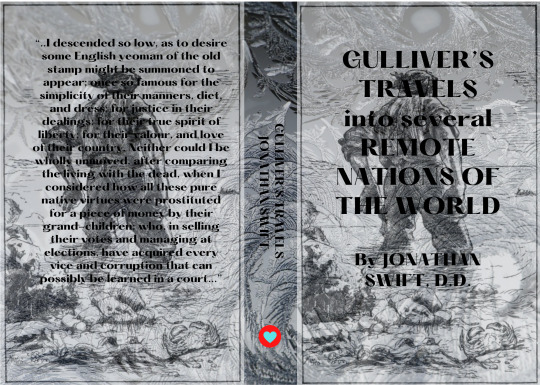
Jonathan Swift's "Gulliver's Travels into Several Remote Nations of the World" is a literary masterpiece that takes readers on a captivating voyage through the eccentric and fantastical realms of satire and social commentary. Originally published in 1726, Swift's novel presents the extraordinary adventures of Lemuel Gulliver, a ship's surgeon who finds himself shipwrecked on four distinct and peculiar lands, each inhabited by beings with their own peculiar customs and ideologies. Through Gulliver's encounters with the Lilliputians, Brobdingnagians, Laputans, and Houyhnhnms, Swift employs biting satire and biting wit to critique various aspects of human nature, society, politics, and religion.
The novel's first section, set in the land of Lilliput, offers a scathing commentary on the pettiness and absurdity of human politics and power struggles. Through Gulliver's experiences as a giant among tiny inhabitants, Swift exposes the folly of war, bureaucracy, and the arbitrary nature of authority. The absurdity reaches its peak with the absurd ritual of Lilliputian politics, including the infamous "Big-Endians" versus "Little-Endians" dispute, which serves as a thinly veiled critique of religious schisms and sectarianism.
In contrast, the second section of the novel transports Gulliver to the land of Brobdingnag, where he becomes a miniature among giants. Here, Swift shifts his focus to a critique of human vanity, arrogance, and the flawed nature of humanity itself. Through Gulliver's observations of the benevolent yet morally repugnant Brobdingnagians, Swift highlights the inherent depravity and moral corruption of human civilization, challenging readers to confront their own flaws and shortcomings.
The third section of "Gulliver's Travels" takes Gulliver to the floating island of Laputa, a realm inhabited by impractical intellectuals and absurd scientific endeavors. Through biting satire and absurd scenarios, Swift lampoons the folly of intellectualism divorced from practicality, as well as the dangers of unchecked scientific experimentation and technological hubris. The Laputans' obsession with abstract theories and impractical inventions serves as a cautionary tale against the pursuit of knowledge at the expense of humanity's moral and ethical obligations.
Finally, in the fourth section of the novel, Gulliver finds himself in the land of the Houyhnhnms, a society of rational, equine beings who govern themselves with reason and virtue. Through Gulliver's interactions with the Houyhnhnms and their brutish human-like counterparts, the Yahoos, Swift offers a stark critique of human nature itself. The Houyhnhnms' rationality and virtue stand in stark contrast to the base instincts and moral degradation of the Yahoos, leading Gulliver to question his own humanity and the nature of civilization itself.
In conclusion, "Gulliver's Travels" is a timeless work of satire and social commentary that continues to resonate with readers today. Through Swift's masterful storytelling and biting wit, the novel offers a profound exploration of human nature, society, and the follies of civilization. By presenting readers with a series of fantastical yet eerily familiar worlds, Swift challenges us to reflect on our own flaws and shortcomings, making "Gulliver's Travels" a compelling and thought-provoking read for audiences of all ages.
Jonathan Swift's "Gulliver's Travels into Several Remote Nations of the World" is available in Amazon in paperback 16.99$ and hardcover 22.99$ editions.
Number of pages: 344
Language: English
Rating: 9/10
Link of the book!
Review By: King's Cat
#Gulliver's Travels#Jonathan Swift#Satire#Social commentary#Political allegory#Lilliputians#Brobdingnagians#Laputa#Houyhnhnms#Yahoos#Fantasy#Adventure#Exploration#Critique of society#Political satire#Human nature#Travel narrative#Political intrigue#Cultural differences#Moral lessons#Allegorical fiction#Absurdity#Irony#Critique of government#Parody#Political corruption#Religious satire#Intellectualism#Scientific hubris#Moral degradation
0 notes
Text
Like, I'm not gonna say that the X-Men and their various imitators are anything like a perfect allegory, but "it's a bad allegory because super powers really are dangerous" has never held water for me. Like, are we really just gonna uncritically accept the implicit assumption lurking in that argument that bigotry is only wrong to the extent that its targets lack the ability to threaten the status quo? Hand-wringing over whether certain minorities are inherently dangerous is – and, critically, always has been – a smoke-screen for the real conversation about who has the right to possess the capacity for violence, and you can't engage with that conversation if your opening move is to concede that the only legitimate victim is a powerless one.
9K notes
·
View notes
Text
I think werewolves are an important part of trans culture *rips your throat out with my teeth*
#lgbtqia#lgbt#transgender#trans#transmasc#trans werewolves#werewolves#I constantly think about werewolves & politics#are you even punk if you don't like werewolves as allegory?
2K notes
·
View notes
Text
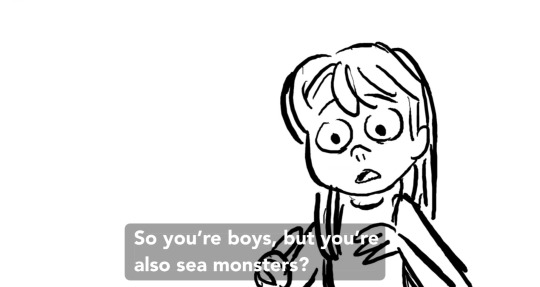
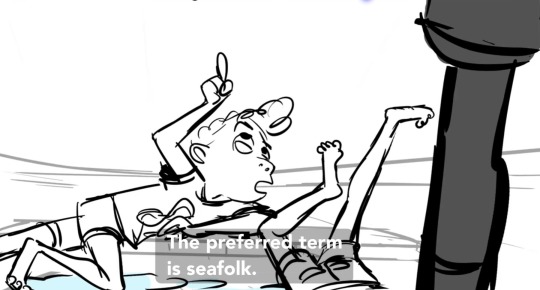
GOD the way I wish this exchange had made its way into the movie
#politically correct alberto#woke alberto#tie that allegory together tight#like obviously not the exchange word for word. but a version of it#luca 2021#pixar luca#alberto scorfano#giulia marcovaldo#luca paguro#<- even tho he’s just his ass#Disney#pixar#100
314 notes
·
View notes
Text
Opinion: I'm an Anti-Specsser and Everyone Else Should Be Too
Why are you wearing glasses?
No, seriously. Why the fuck are you still wearing glasses?
The epidemic is over. I don't know anyone who worries about nearsightedness anymore. Do you hear anyone talking about it? Do you see nearsightedness germs flying around? No, because it's OVER.
Look, I don't know how to break it to you, but a thin piece of glass in front of your eyes isn't going to help protect you from macular degeneration. It's a false sense of security, an illusion; like if you just keep looking through them you can pretend that the world has crisp sharp edges. Well, guess what? The world is blurry. You don't know where empty space ends and your body begins. In fact, it doesn't. Your body is mostly empty space.
Everything happens for a reason, anyway; so if you get into an accident because you can't drive without your glasses? Tough cajones; take your punishment like God intended. It's your fault for having bad genes, which you got because of... original sin, or something. I don't know, I didn't actually read the Bible. I just believe vehemently in every word of it, except the words you use to disagree with me. Because that's wrong.
I don't think I'm doing anything wrong by yelling at glasses-wearers on the street. It just fills me with such visceral, incandescent rage when I see a pair of pince-nez balancing on someone's nose. It's like they're sending a direct fuck-you to people like me, who choose not to wear glasses. So of course I have to yell at them; it's just simple self-preservation - if I don't, pretty soon everyone will be wearing glasses, and ganging up on those of us that don't, because we're "jeopardizing public safety" or "a danger to the common good." I don't need to listen to that.
When you declare you're on the opposite side from me with that flag you wear right on your face, you shouldn't be surprised when I treat you like an enemy. "What sides?" you ask? "There's no 'sides' here; everyone is just choosing-" oh, shut up. You're so naive. Of course there are sides. There's sides to everything. What about a circle? you say. Inside and outside. There. Now don't you feel stupid.
And those circles you wear on your face mark you as being on the inside. I don't like that. Nobody likes being left on the outside. So stop wearing them. That way I can find something else to be angry about, like freckles. I think I'll take on freckles next. If you have them, stop having them. You're being too different from me and I don't like it.
#swearing#satire#parody#covid allegory#anti-maskers#glasses#unreality#bastardized christianity#evangelical philosophy#public health#public safety#ocular health mention#eyes#aggressive language#current events#american politics#I literally could not make anti-masker sentiments sound more illogical if I tried#original
434 notes
·
View notes
Text

The Apotheosis of War by Vasily Vereshchagin, 1871.
#classic art#painting#vasily vereshchagin#russian artist#19th century#realism#allegorical art#political allegory#skulls#pile of skulls#birds#crows#desert
52 notes
·
View notes
Text

learn your fucking history
(IMAGE ID: A man sitting in a pew in a church labeled “Modern Who is too political”. Behind him is a person with a gun labeled “Vengeance on Varos’ election subplot”. Behind them is another person with a gun labeled “Genesis of the Daleks’ fascism allegory”. From a hidden corner is a sniper pointing a gun at that person, labeled “Barbara saying trans rights in The Aztecs”.)
#for reference those stories came out in 1985 1975 and 1964 respectively#and that’s barely even scratching the surface of this show’s history of political commentary#there’s the thatcherism arc with a pink tardis#eight saying that he’s never had a gender#three casually mentioning that he’s good buddies with chairman mao of all people#(watching several decades worth of writers for the show try to figure out what to do with that is fun)#nuwho’s gotten in on the fun too since like. aliens of london#i’m not saying it’s perfect but i am saying that i would like to know the definition of political commentary that#exists in the head of people who make these kinds of dumbass complaints#doctor who#classic who#vengeance on varos#genesis of the daleks#the aztecs#barbara wright#with genesis of the daleks it’s not even an allegory as much as it is terrance dicks beating you over the head with theconsequencesoffascis#how the fuck do you miss that
58 notes
·
View notes
Text
#my dumb stuff#poll#polls#tumblr polls#im just curious mostly#totally won’t influence the way I write them at all#in a silly way of course#never mind the fact that these are some of my players in a high stakes sci fi ish political drama allegory that I’m writing#not the Main Two tho that are pitted against eachother these are just the main spy type cast they have at their disposal#for some good old fashioned espionage and power of information type shit#my Main Two are funny tho cus one of them is essentially a JFK stand-in and the other ones like#what if the most insufferable Wall Street bro you’ve ever seen genetically modified to be as annoying as humanly possible was also#incredibly good at giving speeches and making money#and he sucks so bad btw I hate his guts but he’s also my twisted babygirl#I love my Kennedy boy too tho what can I say#I love my writing projects#this one’s got a cool name too and I feel like if I can get the plot worked out I’d have a really cool standalone novel#I’ve got the themes and writing style and some characters worked out same with particular motifs and repeated metaphors and stuff#I just need the plot beats#and I just read John Trubys Anatomy of Genres so like I’m psyched and ready to go baby this is gonna be so fun
16 notes
·
View notes
Note
Which is your favourite and least favourite harry potter book?
while i think Prisoner of Azkaban is the best on a technical level, my favorite is Goblet of Fire. because it's a fucking blockbuster. like, this is a book that is firing on all cylinders, trying to do a million billion things at once, and it executes the fuck out of basically everything. besides the fact that it dives deeper into character dynamics than any previous book (ron and harry! hermione and ron! hermione and krum! sirius and harry! ron and percy! etc!!), it's a massive expansion of the universe: it opens up whole new wizarding hemispheres, new countries, new cultures, TONS of new characters, the Quidditch World Cup, the Triwizard Tournament, the Ministry of Magic's bureaucratic politics, the Old Guard death eaters, and the beginning of the Order of the Phoenix. it gives us Fleur and Krum and Mad-Eye Moody and Cho and Cedric and Charlie Weasley, and the first taste of Snape's backstory, not to mention pensieves and mermaids and fucking dragons, like sorry, are you seeing this shit??
and then, finally, it gives us the beginning of the second wizarding war. it gives us the graveyard scene and Cedric Diggory's sacrifice, one of the best and most important moments in any book ever, because it's the whole story in a nutshell, and it's also the moment that the plot starts. Goblet is the crux of the entire series, and it nails almost everything. (the exception being the Moody plot twist, which... I did not love, but like: must a conclusion be "good"? is it not simply enough for a story to plow headfirst off the rails in a wildly entertaining direction, and then end? i think it is.)
so those are what I see as the Objective Goods of Goblet. my Subjective Goods are: i love a tournament arc, i love a GAME, i love a set of rules and rituals and ceremonies and opportunities to demonstrate character through contrasting behavior in response to pre-ordained challenges and rule sets. i love you Yule Ball, i love you prom arc, i love you dressing characters up in silly little outfits and making them take each other on dates, i love you teenage drama and misunderstandings and jealousy and teenybopper romantic subplots. i love you goblet of fire.
#least favorite is easily deathly hallows#i've bitched about it on here before but deathly hallows just misunderstands the story that it's ending#in a way that is almost unforgivable as the last note for a series#you can't just end your seven-book saga about the world-saving potential of love and community by having your protagonist#take off on his own with only two people and bitch at them for 200 pages#reject help at every opportunity refuse to tell any of his adoptive family shit#have a war happen 95% off-page and then end with a Big Damn Battle where your protagonist becomes a christ allegory#basically solidifying the idea that no actually this guy was just Super Special all along#and the community was nice but really it was All About This One Guy fighting This Other Guy! no politics no themes here folks!#andnowtheyallhavebabies BYE!!#like sorry. L denouement bro
37 notes
·
View notes
Text
Do you know how hard it was not to say anything when watching Opla with my dad. He knows nothing about the anime or manga so I’m just sitting here watching him experience Luffy and friends for the first time while I’m thinking to myself about how he knows nothing about the reindeer doctor or the skeleton musician or the grand line at all or how big the bounties get or ya know the fuckin sun god in disguise we got here
#one piece#Opla#one piece spoilers#not really but just making sure#I mean I could barely hold back explaining the stuff that does show up#like the snail phones#or that money is called berry#but like as soon as mihawk showed up I was barely holding back the verbal essay on the political environment in this world#from the warlord to the emperors to the marines and admirals etc etc#there’s so much he doesn’t realize he doesn’t know#it’s the goddamn cave allegory or whatever#I’ve seen the outside and he’s only seeing shadows#but soon#soon
25 notes
·
View notes
Text
Thinking about the Sabine women who were kidnapped...
(This post mentions rape and misogyny.)
So, in Roman mythology, the founder of Rome was a chap called Romulus. Romulus is a pretty weird founder-figure because he's such an asshole:
Killing his brother Remus over a spat about where to locate their town.
Inviting criminals, hooligans and runaway slaves to build the town, because apparently nobody "respectable" (by Roman standards) wanted to follow him.
Nearly getting himself and his followers slaughtered for kidnapping, and perhaps sexually assaulting, a bunch of their neighbors' daughters.
See, no woman wanted to join Romulus and his little band of nobodies in their malaria-infested swamp. So the Romans invited the Sabine tribe over for a festival and just...kidnapped a bunch of their daughters. And then had kids with them. (Whether consensually or not depends on which version you believe.)
Obviously, the Sabines and other tribes were outraged. War broke out, and was only shut down when the kidnapped women ran out between the armies and begged both sides to stop fighting, because they didn't want to lose either their husbands or fathers. And so the Sabines joined their tribe with the Romans.
The Rape of the Sabine Women is a disturbing legend. You could analyze it as a tale of Stockholm Syndrome, of forced assimilation, and of rape apologism. Even the Romans seem to have found it uncomfortable: Livy takes pains to portray the Romans as only resorting to kidnapping out of desperation, and asking the women very nicely to marry them, rather than sexual assault. Cicero and Dionysus of Halicarnassus write similarly.
But no matter how much you try to pretty it up, it still shows the Roman men as selfish, violent, deceitful crooks. Why on earth would the proud patricians trace their lineage back to this?
Other aspects of this story stand out to me:
It portrays women's intervention in politics as a good thing. They're arguably the most heroic characters here.
It asks us empathize with the women's point of view, and with how they feel torn between both sides.
It asks us to listen to rape victims instead of assuming we know what's best for them.
It reminds us of the horrors and losses of war instead of glorifying it.
As daughters, the women are passive, but as wives and mothers, they gain a voice.
Based on how Roman men tried to soften the story, it clearly confronted them with the ugliness of sexual assault.
Remember, this is a legend that Romans told each other, not historical events. Why would the patriarchal Romans preserve a tale that portrays the men so poorly, and asks us to listen to the women? I have a thought.
If you were a Roman girl, you would probably be married off as a teenager, to a man at least 8-10 years older than you. You would probably have very little say in the matter. Perhaps you would see yourself in the Sabine women, carried off by men they hardly knew, forced to submit to sex. Or maybe you'd relate to how they felt torn between their husbands and children versus their birth family, or to their fear of losing their loved ones in war. Maybe, like the women, your voice would grow stronger as an older adult and mother, and one day you would demand to be taken seriously.
Maybe you would tell your sons this story, in hope that they would hear the pleas of the Sabine women. And perhaps you'd tell your daughters, to reassure them that life goes on even after sexual trauma, and that one day their voices will be heard.
#jlrrt speaks#ancient rome#sabine women#rape mention#the story seems to have risen in prominence during the samnite and social wars#so it may have been a political allegory for civil war and integration#but i can't help imagining what it must have sounded like to Roman women#jlrrt essays
37 notes
·
View notes